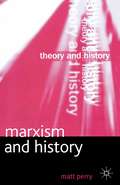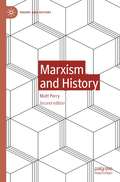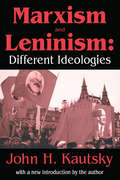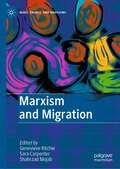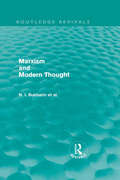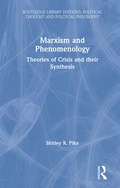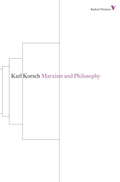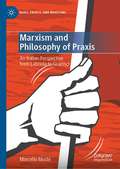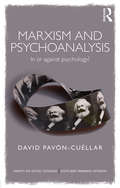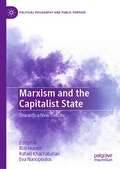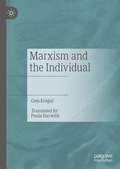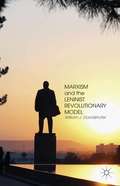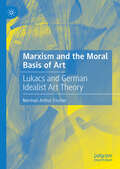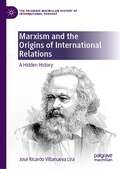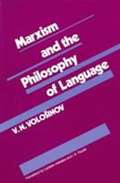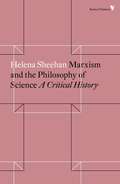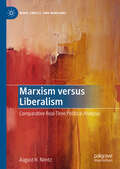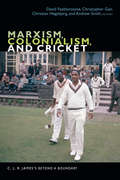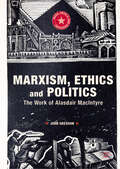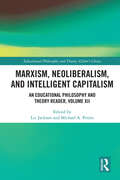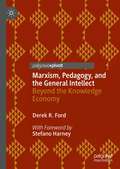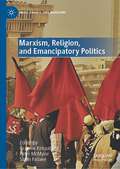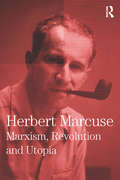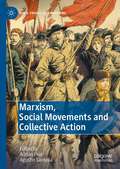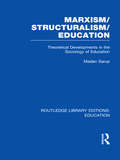- Table View
- List View
Marxism and History (Theory and History)
by Matt PerryMarxism and History examines Marxism's enormous impact on the way historians approach their subject. Tackling current historiographical questions in a lively, jargon-free way, Matt Perry offers a concise introduction to: Marxist views of history; key Marxist historians and thinkers; and the relevance of Marxist theory and history to students' own work.
Marxism and History (Theory and History)
by Matt PerryThis textbook examines Marxism’s enormous impact on the way historians approach their subject. Tackling current historiographical questions in an accessible way, the author offers a clear introduction to Marxist views of history, key Marxist historians and thinkers, and the relevance of Marxist theory and history to students’ own work. This is a concise, thorough overview of an important area of historiography. The second edition incorporates significant new developments in research, including Marxist contributions to the emergence of global, maritime and transnational history; the discovery of Marx’s ecologism and the historical critique of fossil capitalism as a source of environmental disaster; a reassessment of gender oppression through social reproduction theory; and the contribution of Marxism to debates on race, Eurocentrism and whiteness.
Marxism and Leninism: An Essay in the Sociology of Knowledge
by John H. KautskyOne of the pre-eminent scholars in the history and theory of European socialism, John Kautsky in this volume develops the argument that Marxism and Leninism are two quite different ideologies. He counterposes this view with the commonly accepted one of Leninism as simply one form that Marxism took in the course of its evolution. The easy identification of Marxism and Leninism with each other has been responsible for great confusion in the realm of both scholarly and political discourse.Kautsky develops his position within the tradition of the sociology of knowledge, by the close examination of the different meanings of the Marxist vocabulary as it was used by Marxists and Leninists. His frame of reference turns on the position of labor in turn-of-the-century industrial Europe and the role of modernizing intellectuals in underdeveloped countries. While the vocabulary used was often common to Marx and Lenin, Marxism was explicitly concerned with appeals to workers in industrial nations such as Germany and Austria, whereas Leninism appeals to revolutionaries in underdeveloped nations such as Russia and China.Whatever be the current assessment of the future of socialism and communism, Kautsky holds that it is important to study the core structure of both Marxism and Leninism, since they were major phenomena that powerfully affected the world in the twentieth century. Beyond that, in dealing with how different ideologies can be ensconced within the same rhetoric, the book offers an outstanding entrance into the sociology of knowledge as a tool for political analysis. This is a unique work in the function of language no less than the nature of ideology.The work is divided into five parts: Two environments, two ideologies, one terminology. The evolution of Marxism, its appeals in the German Empire. The evolution of Leninism, its appeals to strata involved in making modernizing revolutions. The differential outcomes of Marxism in the East and Leninism in the West. And finally, an examination of why Marxism and Leninism have been seen as a single ideology. In a new essay prepared for this new edition, Kautsky provides important autobiographical as well as historical reflections on how this book fits into the overall pattern of the author's work.
Marxism and Migration (Marx, Engels, and Marxisms)
by Sara Carpenter Shahrzad Mojab Genevieve RitchieThis book approaches migration from Marxist feminist, anti-imperialist, and anti-colonial perspectives. The present conditions of transnational migration, best described as a kind of social expulsion, include migrant caravans and detained unaccompanied children in the United States, thousands of migrant deaths at sea, the razing of self-organized refugee camps in Greece, and the massive dispersal of populations within and between countries. Placing patriarchal capitalism, imperialism, racialization, and fundamentalisms at the center of the analysis, Marxism and Migration helps build a more coherent and historically-informed discussion of the conditions of migration, resettlement, and resistance. Drawing upon a range of academic disciplines and diverse geopolitical regions, the book rethinks migrations from the vantage point of class struggle and seeks to ignite a more robust discussion of critical consciousness, racialization, militarization, and solidarity.
Marxism and Modern Thought (Routledge Revivals)
by N. I. Bukharin A. M. Deborin Y. M. Yuranovsky S. I. Vavilov V. L. Komarov A. I. TiumenievFirst published in English in 1935, this is a vital and stimulating critical appraisal of contemporary thought in the post-World War One era. Written by a selection of leading Marxist thinkers including Nikolai Bukharin, who would later become one of the most famous victims of Stalin's show trials, this work offers a Marxist critique of contemporary thought relating to philosophy, science and history. The authors all lean towards the view that the general tendency of modern thought is to abandon the historical method and to deny progress, with the conclusion that Marxism was the only historical and progressive outlook in science, philosophy and history in the period following the First World War and the Communist revolution in Russia. A fascinating document of great historical and political interest which offers an invaluable insight into contemporary thought in the Soviet Union of the 1930s.
Marxism and Phenomenology (Routledge Library Editions: Political Thought and Political Philosophy #45)
by Shirley R. PikeFirst published in 1986. The social sciences in the twentieth century have tended to fragment into different disciplines and schools of thought. Often these schools of thought are complete but closed systems of thought, permitting no exchange of ideas with other disciplines or schools. In view of this, one very interesting recent development has been the attempt by some Marxist theorists to develop a theory of phenomenological Marxism. At first sight the possibility of a liason between dialectical materialism and subjective idealism appears remote and indeed other Marxists have dismissed phenomenological Marxism as simplistic humanism, revisionist and incompatible with Marxist science. This book explores the possibilities and difficulties of synthesising two apparently disparate philosophical frameworks. It looks at the philosophical roots of the two frameworks and discusses the logic, epistemology, ontology and methodology of each. The author concludes that a synthesis between Marxism and phenomenology is not impossible on philosophical grounds.
Marxism and Philosophy
by Fred Halliday Karl KorschIn Marxism and Philosophy Korsch argues for a reexamination of the relationship between Marxist theory and bourgeois philosophy, and insists on the centrality of the Hegelian dialectic and a commitment to revolutionary praxis. Although widely attacked in its time, Marxism and Philosophy has attained a place among the most important works of twentieth-century Marxist theory, and continues to merit critical reappraisal from scholars and activists today.From the Trade Paperback edition.
Marxism and Philosophy of Praxis: An Italian Perspective from Labriola to Gramsci (Marx, Engels, and Marxisms)
by Marcello MustèThis book will offer a full reconstruction of the history of Theoretical Marxism in Italy between 1895 and 1935, based on a rigorous philological method. The starting term (1895) is marked by the publication of Antonio Labriola's first essay on historical materialism (In memory of Communist Manifesto); the final term coincides with the conclusion of the "Prison Notebooks" written by Antonio Gramsci. This book analyses the original character of the Marxist philosophy in Italy, which emerged by distinguishing itself from the "orthodoxy" of the Second and Third International. By delineating a significant chapter in the history of Marxism, the book will also propose a specific contribution to the history of Italian Philosophy, which is here studied in relation to the developments of European philosophy, beyond the traditional subdivisions of Positivism, Idealism and Marxism.
Marxism and Psychoanalysis: In or Against Psychology? (Concepts for Critical Psychology)
by David Pavon-CuellarThe methods developed by Freud and Marx have enabled a range of scholars to critically reflect upon the ideological underpinnings of modern and now postmodern or hypermodern western societies. In this intriguing book, the discipline of psychology itself is screened through the twin dynamics of Marxism and psychoanalysis. David Pavón-Cuéllar asks to what extent the terms, concerns and goals of psychology reflect, in fact, the dominant bourgeois ideology that has allowed it to flourish. The book charts a gradual psychologization within society and culture dating from the nineteenth century, and examines how the tacit ideals within mainstream psychology – creating good citizens or productive workers – sit uneasily against Marx and Freud’s ambitions of revealing fault-lines and contradictions within individualist and consumer-oriented structures. The positivist aspiration of psychology to become a natural science has been the source of extensive debate, critical voices asserting the social and cultural contexts through which the human mind and behaviour should be understood. This challenging new book provides another voice that, in addressing two of the most influential intellectual traditions of the past 150 years, widens the debate still further to examine the foundations of psychology.
Marxism and the Capitalist State: Towards a New Debate (Political Philosophy and Public Purpose)
by Rob Hunter Eva Nanopoulos Rafael KhachaturianThis book builds on the recent revival of interest in Marx and Marxism, calling for a renewal and refinement of Marxist state theory. It aims to provoke and encourage new debates and critiques that build on—but also update and extend—the rich tradition of Marxist analyses of the capitalist state, including the well-known debates of the 1970s. The chapters present a dynamic and diverse constellation of arguments and perspectives on a range of topics, from general re-appraisals of the capitalist state to investigations of contemporary challenges—including digitalisation, the ecological crisis, the coronavirus pandemic, social reproduction, and critical political economy. What they share is a commitment to an understanding of the specifically capitalist character of the modern state and its significance for any serious discussion of the causes of our current age of global catastrophe and the overcoming of capitalist social relations.
Marxism and the Individual
by Cem EroğulThis book attempts to develop a Marxist theory of the human individual. It contends that the standard description of the human as a bio-psycho-social being is fundamentally deficient as it doesn’t specify which of these attributes is the determining one. As long as this is not done, the real nature of humanity cannot be uncovered.
Marxism and the Leninist Revolutionary Model
by William J. DavidshoferThis book explores Marxist and Leninist revolutionary theory. Topics include: the philosophical dialectic, historical materialism, the revolutionary movement, and Communist cadre political rule in the socialist state. Emphasis on Lenin's wartime political treatment of imperialism, national self-determination, and socialism in one country.
Marxism and the Moral Basis of Art: Lukács and German Idealist Art Theory
by Norman Arthur FischerThis book develops a moral Marxist aesthetics based on the work of Georg Lukács, Lucien Goldmann and Herbert Marcuse, and grounded in the aesthetic theories of German Idealist philosophers such as Hegel and Schiller. This moral-aesthetics takes three forms. The first is social and historical realism, as in Lukács and Goldmann. This is an aesthetics which fundamentally places the work of art within reality, particularly social and historical reality. The second aesthetics is utopian negation theory, and the third is formalism. The book pays special attention to Lukács’ concept of realistic historical novels, which he develops through the analysis of historical novels by Walter Scott, Honore de Balzac and Heinrich Mann. This theory of aesthetic realism is, as the book argues, grounded in Lukács’ reading of Hegel. The book concludes by offering fresh interpretations of the moral basis of Goldmann’s romantic realism in The Hidden God, and Marcuse’s emphasis on art as form and utopian negation of reality in The Aesthetic Dimension.
Marxism and the Origins of International Relations: A Hidden History (The Palgrave Macmillan History of International Thought)
by José Ricardo Villanueva LiraThis book investigates to what extent and in what ways Marxist writings and precepts on imperialism informed the so-called idealist stage of International Relations (IR). Though the formative years of International Relations coincide with a vibrant period in Marxist political thought, Marxism is strikingly absent from the historiography of the discipline. Building on the work of revisionist scholars, the book reconstructs the writings of five benchmark IR thinkers. Villanueva analyzes the cases of John Hobson, Henry Brailsford, Leonard Woolf, Harold Laski and Norman Angell to explore the influence that Marxism played in their thinking, and in the “idealist years” of the discipline more generally. He ultimately demonstrates that, although Marxist thought has been neglected by mainstream IR disciplinary historians, it played a significant role in the discipline’s early development. As such, this book both challenges the exclusion of Marxist thought from the mainstream disciplinary histories of IR and contributes to a deeper understanding of the role it played in early 20th century IR theory.
Marxism and the Philosophy of Language
by I. R. Titunik V. N. Volosnov Ladislav MatejkaVolosinov is out to undo the old disciplinary boundaries between linguistics, rhetoric, and poetics in order to construct a new kind of field: semiotics or textual theory. Matejka and Titunik have provided a new preface to discuss Volosinov in relation to the great resurgence of interest in all the writing of the circle of Mikhail Bakhtin.
Marxism and the Philosophy of Science
by Helena SheehanA masterful survey of the history of Marxist philosophy of science. Now with a new afterword. Skillfully deploying a large cast of characters, Sheehan retraces the development of Marxist philosophy of science through detailed and highly readable accounts of the debates that have characterized it. Approaching Marxism from the perspective of the philosophy of science, Sheehan shows how Marx's and Engel's ideas on the development and structure of natural science had a crucial impact on the work of early twentieth-century natural philosophers, historians of science, and natural scientists. From the ideas of Marx and Engels, those of the Marxist theoreticians of the Second International to the debates within Russian Marxism up to World War II, Sheehan masterfully surveys the history of marxist philosophy of science, concluding with a close analysis of the development of the debate among non-Soviet Marxists, placing particular emphasis on the contributions of leading British Marxists in the 1930s.
Marxism versus Liberalism: Comparative Real-Time Political Analysis (Marx, Engels, and Marxisms)
by August H. Nimtz“An extraordinary work of political historical analysis that methodically and convincingly argues for the superiority of a Marxist approach for pursuing democracy. Rich in historical detail and thoroughly engrossing in portraying the real-time analyses of and intervention in crucial events by prominent Marxist and liberal theorists and political actors, Marxism versus Liberalism is a truly impressive achievement that will have an enduring appeal.” —John F. Sitton, Professor Emeritus, Political Science, Indiana University of Pennsylvania, USAPerforming a comparative real-time political analysis, Marxism versus Liberalism presents convincing evidence to sustain two similarly audacious claims: firstly, that Karl Marx and Frederick Engels collectively had better democratic credentials than Alexis de Tocqueville and John Stuart Mill; and secondly, that Vladimir Lenin had better democratic credentials than Max Weber and Woodrow Wilson. When the two sets of protagonists are compared and contrasted in how they read and responded to big political events in motion, this book contends that these Marxists proved to be better democrats than the history’s most prominent Liberals. Exploring the historical scenarios of The European Spring of 1848, the United States Civil War, the 1905 Russian Revolution, the 1917 Russian Revolution, and the end of World War I, Marxism versus Liberalism carefully tests each claim in order to challenge assumed political wisdom.
Marxism, Colonialism, and Cricket: C. L. R. James's Beyond a Boundary (The C. L. R. James Archives)
by Andrew Smith David Featherstone Christopher Gair Christian HøgsbjergWidely regarded as one of the most important and influential sports books of all time, C. L. R. James's Beyond a Boundary is—among other things—a pioneering study of popular culture, an analysis of resistance to empire and racism, and a personal reflection on the history of colonialism and its effects in the Caribbean. More than fifty years after the publication of James's classic text, the contributors to Marxism, Colonialism, and Cricket investigate Beyond a Boundary's production and reception and its implication for debates about sports, gender, aesthetics, race, popular culture, politics, imperialism, and English and Caribbean identity. Including a previously unseen first draft of Beyond a Boundary's conclusion alongside contributions from James's key collaborator Selma James and from Michael Brearley, former captain of the English Test cricket team, Marxism, Colonialism, and Cricket provides a thorough and nuanced examination of James's groundbreaking work and its lasting impact. Contributors. Anima Adjepong, David Austin, Hilary McD. Beckles, Michael Brearley, Selwyn R. Cudjoe, David Featherstone, Christopher Gair, Paget Henry, Christian Høgsbjerg, C. L. R. James, Selma James, Roy McCree, Minkah Makalani, Clem Seecharan, Andrew Smith, Neil Washbourne, Claire Westall
Marxism, Ethics and Politics: The Work Of Alasdair Macintyre (Marx, Engels, And Marxisms Series)
by John GregsonThis book discusses Alasdair MacIntyre’s engagement with Marxism from the early 1950s to the present. It begins with his early writings on Marxism and Christianity, moving through his period in the New Left and the Socialist Labour League and International Socialism in the late 1950s and 1960s. It then discusses MacIntyre’s break with Marxism by developing the brief but telling five-point critique he gives of Marxism in his 1981 volume After Virtue. Marxism, Ethics and Politics highlights MacIntyre’s continuing admiration for much in Marx’s thought, noting that his contemporary project is developed in response to what he now sees as the inadequacies of Marxism, particularly Marxist politics. It concludes by examining the place of Marxism in the contemporary MacIntyrean debate and by pointing out the contested nature of the claims about Marxism that MacIntyre makes.
Marxism, Neoliberalism, and Intelligent Capitalism: An Educational Philosophy and Theory Reader, Volume XII (Educational Philosophy and Theory: Editor’s Choice)
by Michael A. Peters Liz JacksonThis book explores Marxism and related political-economic theory, and its implications for education around the world, as seen in the history of the journal Educational Philosophy and Theory. As such, it illustrates the evolution of political-economic changes across societies, as they have been brought to bear within the academic field and in the journal, through the exploration of typical and noteworthy articles examining political-economic themes over time. In the early decades of Educational Philosophy and Theory, only a few works can be found focused on Marx’s work, Marxism, and related themes. However, since the mid-1990s, Educational Philosophy and Theory has published many articles focused on neoliberalism and educational responses to theories and policies based on political-economic perspectives. This collection serves to showcase this work, exploring the way Marxist, neoliberal and other related political-economic theories have been applied to educational discussions among philosophers and theorists of education in the history of Educational Philosophy and Theory. As a collection, this book provides a glimpse of a dramatically changing world, and changing scholarly responses to it, during the late nineteenth and early twentieth centuries. This collection can therefore be useful to scholars interested in better understanding how changes to the political economy have intersected with those in education over time, as well as the diverse ways scholars have approached and reacted to a shifting landscape, considering views ranging from Marxist to Post-Marxist, to neoliberal, and beyond.
Marxism, Pedagogy, and the General Intellect: Beyond the Knowledge Economy
by Derek R. FordThis book is the first to articulate and challenge the consensus on the right and left that knowledge is the key to any problem, demonstrating how the left’s embrace of knowledge productivity keeps it trapped within capital’s circuits. As the knowledge economy has forced questions of education to the forefront, the book engages pedagogy as an underlying yet neglected motor of capitalism and its forms of oppression. Most importantly, it assembles new pedagogical resources for responding to the range of injustices that permeate our world. Building on yet critiquing the Marxist notion of the general intellect, Derek R. Ford theorizes stupidity as a necessary alternative pedagogical logic, an anti-value that is infinitely mute and unproductive.
Marxism, Religion, and Emancipatory Politics (Marx, Engels, and Marxisms)
by Graeme Kirkpatrick Simin Fadaee Peter McMylorThis edited collection evaluates the relationship between Marxism and religion in two ways: Marxism’s treatment of religion and the religious aspects of Marxism. Its aim is to complicate the superficial understanding of Marxism as a simple rejection of religion both in theory and practice. Divided into two parts (Theory and Praxis), this book brings together the three different themes of Marxism, religion, and emancipation for the first time. The first part explores the more theoretical discussions regarding the relationship between Marxism and various themes (or currents) within religious thought, to highlight points of compatibility as well as incompatibilities/conflicts. The studies in the second part of the collection refer to how Marxist ideas are received in different parts of the world. They show that as soon as Marxism arrives in a new place, the theory interacts and bonds with a pre-existing stock of ideas, each changing the other reciprocally.
Marxism, Revolution and Utopia: Collected Papers of Herbert Marcuse, Volume 6 (Herbert Marcuse: Collected Papers #6)
by Herbert MarcuseThis collection assembles some of Herbert Marcuse’s most important work and presents for the first time his responses to and development of classic Marxist approaches to revolution and utopia, as well as his own theoretical and political perspectives. This sixth and final volume of Marcuse's collected papers shows Marcuse’s rejection of the prevailing twentieth-century Marxist theory and socialist practice - which he saw as inadequate for a thorough critique of Western and Soviet bureaucracy - and the development of his revolutionary thought towards a critique of the consumer society. Marcuse's later philosophical perspectives on technology, ecology, and human emancipation sat at odds with many of the classic tenets of Marx’s materialist dialectic which placed the working class as the central agent of change in capitalist societies. As the material from this volume shows, Marcuse was not only a theorist of Marxist thought and practice in the twentieth century, but also proves to be an essential thinker for understanding the neoliberal phase of capitalism and resistance in the twenty-first century. A comprehensive introduction by Douglas Kellner and Clayton Pierce places Marcuse’s philosophy in the context of his engagement with the main currents of twentieth century philosophy while also providing important analyses of his anticipatory theorization of capitalist development through a neoliberal restructuring of society. The volume concludes with an afterword by Peter Marcuse.
Marxism, Social Movements and Collective Action (Marx, Engels, and Marxisms)
by Adrián Piva Agustín SantellaThis book makes a relevant contribution to a Marxist critical explanation of social conflicts, social movements and protests. There is abundant literature on social conflict and social movements from Marxist perspectives. However, rigorous criticism, both theoretical and methodological, is scarce. The objective of this volume is the collection of works developing a critical reflection on the categories of theories about contentious collective action and social movements from a Marxist perspective. In order to better understand these phenomena and go beyond their mere case description, the theory needs to be improved. To that end, the book also promotes the debate between Marxisms and the collective action and new social movements in a renewed way. Here different Marxist arguments consider not only their methodological and ideological bias, but also the specific conceptual contributions of those theories.
Marxism/Structuralism/Education: Theoretical Developments in the Sociology of Education (Routledge Library Editions: Education)
by Madan SarupThis interdisciplinary textbook provides an introduction to the many theoretical developments and controversies which took place in the sociology and politics of education during the 1970s and 80s. The book Discusses the arguments concerning humanist and structuralist Marixsm. Provides a clear and concise introduction to structuralism and post-structuralism (work of Derrida, Lacan and Foucault) and theorises in the ways they contribute to Marxism or are subversive of it. Relates these theoretical perspectives to education and the practice of teachers.
